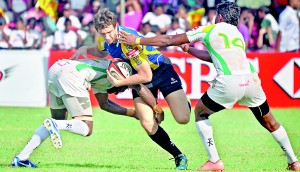Developing winning strategies
View(s):What is next in rugby for Sri Lanka has only one answer; to develop a win-win culture as we ascend the ladder. With Sri Lanka being among the top nations in Asian Rugby in Sevens and Fifteens it is important to remember that the way down is much easier than the way up. The most important is to avoid the way down. This is not a game of snakes and ladders where you rise on the cast of a dice or loose in another. Working towards the goal line to be among the top nations of rugby in Asia requires all stakeholders to work together to achieve a goal that is within our reach. That is a culture we need to build.

For Sri Lankan Rugby the mission is to be among the best in Asia
Talking of a culture I am reminded of Yves Guillemot the CEO of, Ubisoft. The leading international developer, publisher and distributor of interactive entertainment products popularly known as — “Video Games.” For him it has never been about making cheap games but to make highest quality games at competitive costs. This requires a strong pipe line of computer science students to fill in the jobs. In managing the various locations around the globe he uses the same managerial culture of collaboration. One way he uses: is to have a team of 80 to 90 including managers together in a single “war room” to create the games core technology. That culture is common and spread to all location to achieve the Mission of Ubisoft.
Compared to a giant like Ubisoft spread across Australia, China, Canada, Germany, Romania, Morocco the SL Rugby Union Consists of a handful of provinces and clubs at the top level that can be counted using fingers of both hands. Therefore the building of that winning culture should be a much simpler task. However in practice it may not be that simple as changing to a mutual environment may be a little alien to a citizenship who prefer to pull someone by the leg as he attempts to takeoff.
The reason for me to talk about the management culture of Ubisoft is because I hear and read about the rumbling of non release of players by some of the constituent clubs. This is not limited to the sevens team but also to the fifteens who are getting ready to play a tri nation series. Just as the company needs a strong pipeline of computer scientists the rugby team needs a pool of players to draw from. That pool has to be provided by the clubs. For clubs to survive and continue it needs players to show results. It is a case of coexistence of each other and the better the national team does the better it will be for the game. Yves Guillemot can go to many Universities and many countries to get the staff he needs and in that sense his job is easy; may be that is what you think. In one instance the Shanghai studio was assigned to develop a racing game and it was some time before he realized that nobody in the team knew how to drive. That lack of experience on the other hand meant that designers were more open to try a risky idea. That is probably a cue for Sri Lanka Rugby to think of as a team and to move forward despite adversity is not a problem if the culture is right.
Take for instance our habit of putting the blame on others when something goes wrong. If you are tested positive for banned substances the excuses are sometimes hilarious. Read some of the pleading that have been made at inquires at the IRB and you will realize the issues. The coach, a physic is responsible as the evidence suggest. Or else it was because all others took it or I did not know English and therefore could not read what was on the label. It is a culture of responsibility shifting garnished with a dose of the baby belongs to somebody else. You lose a match and the referee is at fault forgetting that the players dropped the ball or missed tackles “N” number of times.
In a recent communiqué the IRB has advised that it is undertaking a process of increasing anti –doping awareness across all Unions and Regional Associations in Membership of the IRB. It has brought to the attention of the Unions their responsibility to provide education to the rugby community. The governing body has made it compulsory for players taking part in IRB tournaments to complete the e-learning program while requesting Unions to encourage this program at all levels of the game. They also expect that parents as well as support personnel educate themselves through the e-learning program.
This is an opportunity to change the culture of shifting responsibility to others while encouraging the responsibility being placed on the shoulders of those who are involved. Possibly the start should be to ensure that coaches as well as mangers and masters in charge are made to carry the certificate and this should follow with players.
In the words of the President Pearson Digital Learning Robert Roliardi no matter where people “sit” in the organisation everyone needs to understand the mission, realize how their work fits to insure success and understand how valued their contributions are. For Sri Lankan Rugby the mission is to be among the best in Asia and no matter where you sit you have a role to play.
Now Sri Lanka must work seriously towards the winning goal.
Vimal Perera is a former Rugby Referee, coach and Accredited Referees Evaluator IRB
comments powered by Disqus

